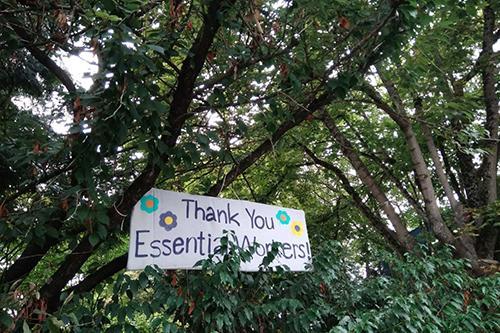Coronavirus and Dementia in Care Homes
A new study has shown that social care staff have faced extensive challenges and a ‘lack of guidance’ during the COVID-19 pandemic. Frequently changing policies and guidance which took little account of the nature of dementia, are amongst a list of serious concerns unearthed by University of Bradford researchers. Twenty dementia care practitioners were involved in the recent study, most of whom are working within residential and nursing homes in the UK. The team also received contributions from Ireland, Germany, Canada and Australia.
Dr Andrea Capstick, Associate Professor in the Faculty of Health Studies at the University of Bradford, headed up the study, along with team members Dr Ana Barbosa, Dr Giorgia Previdoli and Clare Mason from the Centre of Applied Dementia Studies.

Dr Andrea Capstick
Dr Capstick said: “The study took place in three phases. In the first we invited participants to share their experiences of caring for people living with dementia during the Covid-19 pandemic through one-to-one interviews, online discussion groups or written personal accounts. In the second phase, for a period of six weeks, we invited participants to keep a photo-diary of their thoughts and feelings about living through the pandemic. In the third phase, participants and a team of Experts by Experience contributed to the Centre for Applied Dementia Studies blog.
It is now clear that when the coronavirus pandemic hit in March 2020, there was an unprecedented impact on care homes for people living with dementia. Approximately 420,000 people over 65 were living in care homes in the UK at the beginning of 2020, and around 75 per cent of this population had some degree of dementia. Knowing that age and comorbidity were key risk factors for coronavirus, experts have said that it should have been easy to predict that the care home population with dementia would be at extremely high risk.
In May 2020, the UK Alzheimer’s Society acknowledged that care homes were being ‘left to fend for themselves against coronavirus’. During the first wave (March-June 2020) around half of all coronavirus–related deaths in England are believed to have been care home residents, 75% of them died in the care home where they had been living (Scobie 2021). A study of 9,081 care homes found that 56% reported at least one confirmed case of Covid-19 (Comas-Herrera et al 2020). Further studies have found that care home staff have experienced heightened stress and burnout (Embregts et al 2020) and that their mental health suffered during the pandemic (Pautz et al 2020).
The Findings of the Coronavirus and Dementia in Care Homes Study…
The research team have now published their key findings in a booklet. They found four key themes:
- Fear, confusion and a lack of guidance
- Detrimental impact on quality of life and relationships
- Doing invisible work; feeling unseen or under-valued by society
- Creative solutions amidst uncertainty and finding the positives in a challenging environment
The report showed that fear, uncertainty and a lack of clear guidelines were the most vivid memories of the early weeks of the pandemic and the first lockdown. In the following weeks, participants within the study commented that guidance was changing frequently and staff felt that making the right decision about crucial aspects of care was very difficult.
Other key findings showed that staff had to deal with unprecedented circumstances whilst also coping with their own fear and grief and, increasingly, with feelings of guilt and helplessness. Even in care homes that did not experience outbreaks, implementing social isolation and distancing created many ethical dilemmas which made providing care harder, and in many cases, this was also felt to infringe on the human rights of the people with dementia concerned. As one participant said ‘We felt just very overwhelmed that there was no clear direction. There was a lot of questions being raised by family members that staff didn’t have answers for. Questions were also being raised by staff around their safety and wellbeing that we didn’t have answers for.

It felt awful. It felt uncertain and that no one had any idea what to do.
A participant told the university team that suddenly the sound of a cough became something to dread: ‘It’s just the fear that when they hear a resident cough, they all quite literally went into red alarm mode - what do we do now?’ Others reported that they and their residents ‘consistently took part in the weekly claps for the NHS, it made us wonder who was clapping for us’ and that ‘not only were you dealing with outbreaks of Covid-19, you also now had to care for residents who could not be admitted to hospital for other conditions. You had to impose isolation measures on residents too confused to understand what was happening to them, cope with inadequate personal protection equipment (PPE) and cover for colleagues absent as a result of their own illness or self-isolation.’
With many within the care sector arguing that the issue of coronavirus and dementia in care homes was barely being acknowledged by government or the media for many weeks after the pandemic began, researchers at the Centre for Applied Dementia Studies decided to undertake this study to gain an insight into the experience of Covid 19 in care homes, by hearing the voices of those in the frontline.

Dr Andrea Capstick said: “People with dementia often do not retain information and are not able to understand the reasons for measures such as social distancing, removal of family visits and covid testing. They may repeatedly ask for such measures to be explained or become upset because they think relatives don't want to see them anymore. These measures were, then, extremely difficult to implement and often had a profoundly negative effect on the well-being of the people with dementia concerned. During the Covid-19 pandemic social care staff working in care homes have received far less media attention than NHS staff, yet around half of the people who died in the first wave of the pandemic were living in care homes, and around 75% of those will have had some degree of dementia.”
On the back of the research, the University of Bradford’s Centre for Applied Dementia Studies launched a booklet titled 'Looking for the light'. The centre also launched the campaign, 'Let's hear it for care home workers' to give social care staff working with people with dementia the recognition they deserve for the demanding and often heart-breaking work they do. The campaign is an evidence-based plea for equal status for social care staff whose work is often relatively invisible. Dr Capstick added:

At a time when we are all looking for a light at the end of the Covid-19 tunnel, we hope our published findings will help to raise awareness of what really happened in care homes during the pandemic of 2020-21. We hope the booklet will be distributed throughout the sector, and that communities will join us in our campaign to gain more recognition and appreciation for the vital work that is done every day by the dementia care workforce.
